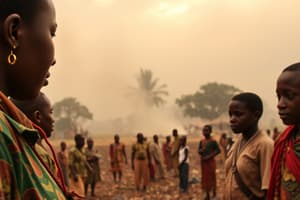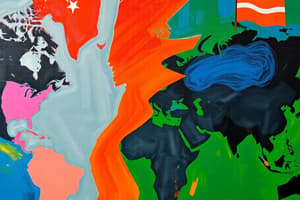Podcast
Questions and Answers
Which leader became the first Prime Minister of Congo?
Which leader became the first Prime Minister of Congo?
- Patrice Lumumba (correct)
- Kwame Nkrumah
- Frantz Fanon
- Mahatma Gandhi
What was the Non-Aligned Movement associated with?
What was the Non-Aligned Movement associated with?
- Advocating for neutrality in the Cold War (correct)
- Advocating for colonialism
- Promoting alliance with a specific superpower
- Supporting the Cold War
Which country used tactical nuclear weapons during a war for independence?
Which country used tactical nuclear weapons during a war for independence?
- Indonesia
- Algeria (correct)
- India
- Cuba
What type of process did some former colonies use to gain independence?
What type of process did some former colonies use to gain independence?
What were some of the challenges faced by newly independent nations?
What were some of the challenges faced by newly independent nations?
Which movement continues to shape the modern world's geopolitical landscape?
Which movement continues to shape the modern world's geopolitical landscape?
What historical movement redefined the geopolitical landscape?
What historical movement redefined the geopolitical landscape?
Which event put a spotlight on the moral and political shortcomings of colonialism?
Which event put a spotlight on the moral and political shortcomings of colonialism?
Which organization affirmed the principle of self-determination in 1945?
Which organization affirmed the principle of self-determination in 1945?
Who played a vital role in leading India's struggle for independence from British rule?
Who played a vital role in leading India's struggle for independence from British rule?
Study Notes
Unraveling Modern History: The Era of Decolonization
As we delve into the intriguing world of modern history, our focus lies on a pivotal movement that redefined the geopolitical landscape -- decolonization. This period marked the time when nearly all the colonies gained their independence from the European powers, which catalyzed the creation of new nations, realigned global alliances, and profoundly shaped the world as we know it today.
Background
The dawn of decolonization can be traced back to the aftermath of World War II. The war put a spotlight on the moral and political shortcomings of colonialism, with many colonies affirming their right to self-determination and freedom from foreign rule.
The United Nations (UN) played a significant role in this process. The UN Charter, adopted in 1945, affirmed the principle of self-determination, which encouraged the aspiration for independence across the globe. The 1960 Declaration on the Granting of Independence to Colonial Countries and Peoples further reinforced the UN's commitment to the decolonization process.
Key Players
Several countries led the charge for decolonization. The leading lights included:
- Jawaharlal Nehru (India): As India's first Prime Minister, Nehru played a vital role in leading India's struggle for independence from British rule and was an influential voice in the international decolonization movement.
- Kwame Nkrumah (Ghana): He led Ghana's independence movement, which culminated in their nation's freedom in 1957. Nkrumah was also a prominent figure in the Non-Aligned Movement, advocating for a neutral role in the Cold War.
- Patrice Lumumba (Democratic Republic of Congo): Lumumba led Congo's independence movement and became the country's first Prime Minister. Sadly, Lumumba was assassinated in 1961.
- Frantz Fanon (Algeria): Fanon was a prominent figure in the Algerian War of Independence, which led to the country gaining independence from France in 1962. Fanon's writings on colonialism and the psychology of colonialism continue to shape our understanding of the period.
The Decolonization Process
The decolonization process unfolded through various paths. Some countries gained independence through peaceful negotiations, while others were forced into independence by violent struggle. Regardless of the route, the process had a profound impact on the global landscape.
- Negotiated independence: Many former colonies were granted independence through negotiations with the colonial power. These countries include India, Indonesia, and Burma (Myanmar).
- Violent struggle: The most famous example of violent struggle leading to independence is the Algerian War of Independence. The war lasted from 1954-1962 and was marked by violence, terrorism, and the use of tactical nuclear weapons by France.
- Revolution: Some former colonies' independence was won through revolution, such as the Cuban Revolution in 1959 and the Sandinista Revolution in Nicaragua in 1979.
Legacy & Challenges
Decolonization brought forth profound changes to the global landscape. The new nations formed from the decolonization process faced significant challenges. These included:
- Economic challenges: Many of the newly independent nations inherited a fragile economic structure from their colonial past.
- Political challenges: The new governments struggled to establish stable political systems, which led to political instability in some countries.
- Social challenges: Many newly independent nations faced social challenges, including ethnic tensions and civil unrest.
Despite these challenges, the decolonization process led to the creation of many successful nations. The legacy of decolonization continues to shape the modern world. The principles of self-determination and independence embodied in the decolonization movement are still relevant in today's geopolitical landscape. As we look to the future, we can learn from the lessons of the past. By understanding the complexities of the decolonization process, we can better appreciate the achievements and challenges that the newly independent nations faced in their quest for freedom.
Studying That Suits You
Use AI to generate personalized quizzes and flashcards to suit your learning preferences.
Description
Test your knowledge on the era of decolonization, a pivotal movement that led to the independence of colonies, realigned global alliances, and shaped the modern world. Explore the key players, the decolonization process, and the legacy and challenges resulting from this transformative period.




